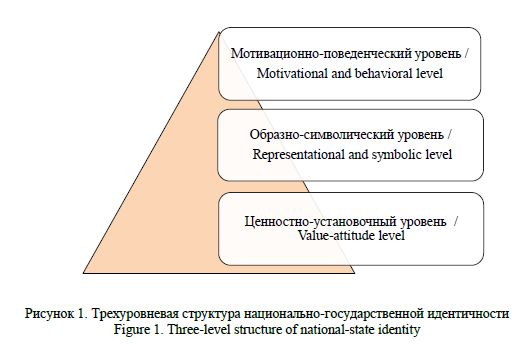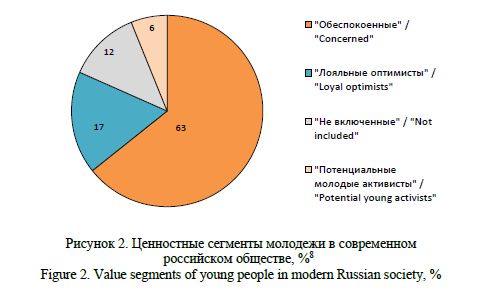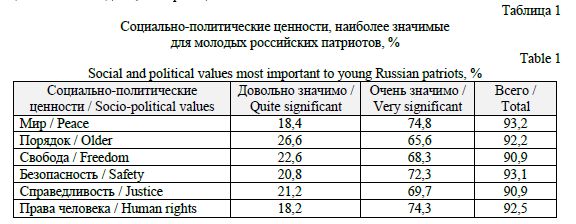The value basis of the formation of national-state identity of youth in contemporary Russia
The relevance of the research is due to the need for comprehensive study of the value bases influencing the formation of a stable, consolidating model of national-state identity in the political consciousness of Russian youth. In the context of Russia's acute mental and political confrontation with Western countries, the importance of such an identification model is increasing today. Scientific problem: The socio-political changes and geopolitical challenges of the 2010s and early 2020s have contributed to a significant transformation of mass consciousness in modern Russia. They have also had a significant impact on the content and characteristics of the main semantic components that constitute the national-state identity of Russian youth. This highlights the need for further research on the specific features and value foundations of the formation of the national-state identity of Russian youth in the context of increasing foreign policy conflicts and internal social uncertainty. The theoretical and methodological foundations of the research are conceptualized on the combination of an identity study and theories of political values. The empirical basis of the study is found on a set of data from mass sociological surveys on the issues of values of Russian youth (conducted by leading Russian sociological centers) and the results of the research project «Value orientations of Russian youth in the context of global change», implemented by researchers of the State University of Management in 2024. Research Results. The study found that the actualisation of negative geopolitical narratives, and the formation of an image of an enemy in the form of the 'collective West', were important but not dominant components of the value-semantic transformation of the national-state identity of Russian youth between 2014 and 2024. This trend has led to a noticeable emphasis among Russian youth on a negative model of national-state self-identification. While the basic value orientations of Russian youth remain important, they are characterised by a partial cognitive deficit, significant distortion and, consequently, amorphous semantic frames. Conclusions. The revealed trends of aberration and partial deficit of meanings contained in the key political values of Russian youth are today a serious deterrent preventing the formation of a full-scale, cognitively saturated model of national and state identity in the political consciousness of young Russians.
Figures



Chuev, S. V., Titov, V. V. (2025), “The value basis of the formation of national-state identity of youth in contemporary Russia”, Research Result. Sociology and management, 11 (3), 118-137. DOI: 10.18413/2408-9338-2025-11-3-0-8.


















While nobody left any comments to this publication.
You can be first.
Evgenieva, T. V., Titov, V. V. (2010), “Formation of national-state identity of Russian youth”, Polis. Politicheskie issledovaniya, (4), 122-134, EDN: MNJSHF. (In Russian)
Zvereva, E. A. (2018), “Features of media consumption of “generation Y” and “generation Z””, Sotsialno-gumanitarnye znaniya, (8), 205-216, EDN: XZIPRR. (In Russian)
Zubok, Ju. A., Berezutsky, Ju. V. (2020), “Social activity of youth: ideological foundations of self-regulation”, Vlast i upravlenie na Vostoke Rossii, (2), 89-105, DOI: 10.22394/1818-4049-2020-91-2-89-105, EDN: UOMSPG. (In Russian)
Zubok, Yu. A., Chuprov, V. I., Lyubutov, A. S., Sorokin, O. V. (2021), “Life positions of young people: semantic bases of formation”, Vestnik Instituta sociologii, (3), 79-98, DOI: 10.19181/vis.2021.12.3.738. (In Russian)
Zubok, Yu. A. (2022), “Changing social reality: reflection of theoretical and empirical aspects of sociological research of youth”, Research Result. Sociology and management, 8 (3), 10-30, DOI: 10.18413/2408-9338-2022-8-3-0-2. (In Russian)
Komarovsky, V.S. (2015), “Formation of national-state identity in Russia: challenges and risks”, Vlast, (3), 20-27, EDN: TNRRET. (In Russian)
Korosteleva, T. V. (2020). Lichnostnye resursy v upravlenii kachestvom zhizni molodezhi: strategii, instrumenty, izmereniya [Personal resources in managing the quality of life of young people: strategies, tools, measurements], Naukoemkie tehnologii, Sankt-Peterburg, Russia, ISBN: 978-5-6044793-1-5, EDN: QEZJLM. (In Russian)
Kotlyarevich, A. N. (2023), “The values of modern Russian youth: a neoliberal trend”, Kultura i bezopasnost, (1), 5-15, DOI: 10.25257/KB.2023.1.5-15. (In Russian)
Malinova, O. Ju. (2010), “The construction of a Macropolitical identity in post-Soviet Russia: symbolic politics in the transforming public sphere”, Politicheskaya ekspertiza: POLITJeKS, (1), 5-28, EDN: MVGSDT (In Russian)
Neumann, I. (2004), Ispolzovanie «Drugogo». Obrazy Vostoka v formirovanii evropeiskikh identichnostey [Using the “Other”. Images of the East in Recent European Identities], translated from English by V. Litvinov, I. Pilshchikov, New Publishing House, Moscow, Russia. (In Russian)
Popova, O. V. (2020), “On unsolved problems of the Theory of State Identity Policy in Russian Political Science”, Politicheskaya nauka, (4), 86-110, DOI: 10.31249/poln/2020.04.05 (In Russian)
Rastorguev, S. V., Titov, V. V. (2024), “The crisis of the Russian national-state identity at the end of the XX – beginning of the XXI century: factors, specifics, representations”, RUDN Journal of Political Science, (2), 277-291, DOI: 10.22363/2313-1438-2024-26-2-277-291, EDN: NJDGXY. (In Russian)
Samsonova, T. N., Zinenko, V. E. (2021), “Formation of the political subjectivity of youth in modern Russia: criteria, conditions, problems”, Obshhestvo: politika, ekonomika, pravo, (3), 17-24, DOI: 10.24158/pep.2021.3.2, EDN: SSLJPD. (In Russian)
Selezneva, A. V. (2019), “Conceptual and methodological foundations of the political and psychological analysis of political values”, Vestnik Tomskogo gosudarstvennogo universiteta. Filosofiya. Sotsiologiya. Politologiya, (49), 177-192, DOI: 10.17223/1998863X/49/18, EDN: GOSNKF. (In Russian)
Selezneva, A. V. (2020), “Political values of Russian youth: socio-cultural characteristics and identification potential”, Obshhestvo. Kommunikatsiya. Obrazovanie, (3), 20-32, DOI: 10.18721/JHSS.11302. (In Russian)
Smulkina, N. V., Usmanova, Z. R. (2023), “Actualization of images of the past in citizens' ideas about the future of Russia”, Politicheskaya nauka, (2), 254-272, DOI: 10.31249/poln/2023.02.11, EDN: HEYMLZ. (In Russian)
Stepanova, G. S. (2020), “The content of social ideas about the state and the Fatherland among modern youth as a manifestation of patriotism”, Mezhdunarodny nauchno-issledovatelsky zhurnal, (4-2), 107-110, DOI: 10.23670/IRJ.2020.94.4.046. (In Russian)
Titov, V. V. (2023), “Patriotism in the structure of national-state identity of Russian youth”, Obshhestvo: politika, ekonomika, parvo, (11), 50-55, DOI: 10.24158/pep.2023.11.5, EDN: QQCNQJ. (In Russian)
Haly, I. A. (2017), “Patriotism in Russia: the experience of typologization”, Sotsiologicheskie issledovaniya, 2 (394), 67-74, EDN: YGAMSJ. (In Russian)
Tsennostnye orientatsii rossyskoy molodezhi i realizatsiya gosudarstvennoy molodezhnoy politiki: rezultaty issledovaniya [Value orientations of Russian youth and the implementation of state youth policy: research results] (2017), Izdatelsky dom GUU, Moscow, Russia. (In Russian)
Chuev, S. V., Polyakov, M. B. (2017), “The main problems of the development of the sphere of state youth policy”, PolitBook, (3), 45-63, EDN: ZSVRMV. (In Russian)
Shestopal, E. B. (2019), “The project is a quarter of a century long. A study of images of power and leaders in post-Soviet Russia (1993-2018)”, Polis. Politicheskie issledovaniya, (1), 9-20, DOI: 10.17976/jpps/2019.01.02. (In Russian)
Schmitt, K. (2016), Ponyatie politicheskogo [The Concept of the Political], translated from German by A. F. Filippov, Nauka, St. Petersburg, Russia. (In Russian)
Ariely, G. (2012), “Globalisation and the decline of national identity? An exploration across Sixty three countries”, Nations and nationalism, 3(18), 461-482, DOI: 10.1111/J.1469-8129.2011.00532.X.
Bell, D. (2003), “Mythscapes: Memory, Mythology, and National Identity”, British Journal of Sociology, (1), 63-81, DOI: 10.1080/0007131032000045905.
Best, H. (2011), “The Elite-Population Gap in the Formation of Political Identities”, A Cross-Cultural Investigation. Europe and Asia Studies, (6), 995-1009, DOI: 10.1080/09668136.2011.585751.
The study was conducted by a team of authors from the Federal State Budgetary Educational Institution of Higher Education “State University of Management” as part of the implementation of the state assignment of the Ministry of Science and Higher Education of the Russian Federation for the Project “Value Orientations of Russian Youth in the Context of Global Changes” (FZNW-2024-0029), registration number NIOKTR 124092700024-1.